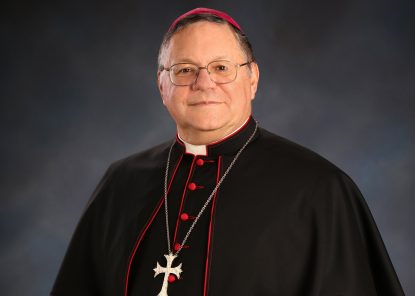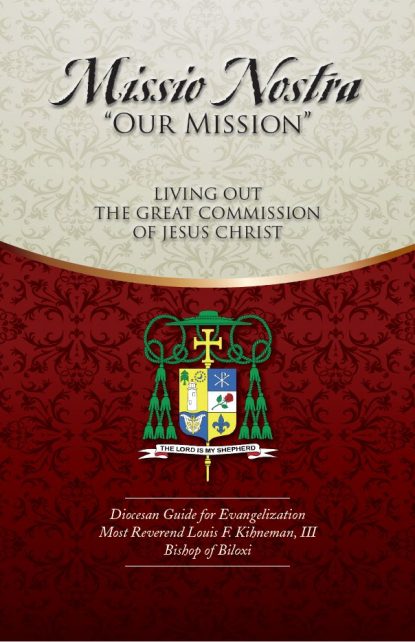
Bishop Louis F. Kihneman III of Biloxi, Miss., is seen in this undated photo. (CNS photo/courtesy Gulf Pine Catholic)
After years of watching cultural trends in the U.S. Catholic Church and the nation overall, bishop, came to a stark realization.
To survive and flourish in an increasingly secular climate, he said, the church needs to completely change the way it does things, moving from what Bishop Kihneman calls a “culture of maintenance to one of mission.”
A new evangelization initiative launched earlier this year in the Biloxi Diocese aims to transform Catholic life in southern Mississippi along these lines.
Called “Missio Nostra” (“Our Mission”): Living Out the Great Commission of Jesus Christ,” it outlines a vision that makes active discipleship the central goal for every Catholic individual, family, parish, school and ministry.
It’s a massive new undertaking that will demand buy-in from everyone in the diocese to be effective, and will require changes in the day-to-day workings of many ministries and programs, ranging from the Rite of Christian Initiation, or RCIA, to religious education, youth ministry and Catholic schools.
[hotblock]
However complex it might seem, however, “Missio Nostra” is based around one of the foundations of Christianity itself: the Great Commission. This is the much-quoted excerpt from Matthew 28:16-20 where Christ tells his apostles to go and make disciples of all nations.
Evangelization, Bishop Kihneman said, is the key to the very reason the Catholic Church exists, and as a result every Catholic must make it a priority.
The best way to make this happen, he said, is to make the formation of disciples an ongoing part of each person’s life in the church.
“I’ve been a priest almost 44 years and a bishop for four years, and over the years after looking at many different programs, I finally realized that with the Great Commission, Jesus is talking to us about a process, not a program,” Bishop Kihneman told the Gulf Pine Catholic, Biloxi’s diocesan newspaper.
“Jesus is asking us four basic questions with the Commission,” he said. “Are you making disciples? Are you baptizing all nations? Are you teaching folks all he has commanded us, and are you teaching people that he is with us until the end of the age?”

This is the cover of “‘Missio Nostra’ (‘Our Mission’): Living Out the Great Commission of Jesus Christ,” a new evangelization initiative launched by Bishop Louis F. Kihneman III of Biloxi, Miss. (CNS photo/courtesy Gulf Pine Catholic)
“Those questions have been burned into my heart over time,” he added. “We really need to take a hard look at our parishes, schools, ministries and institutions and see how we are answering those questions.”
Ministries and programs that can’t answer those questions in the affirmative aren’t contributing to the healthy growth of the church and need to change the way they are doing things to make the Great Commission a priority, Bishop Kihneman said.
This is especially important in light of some studies that say more than 85% of Catholic youth are leaving the church and that 75% of those entering the church through the RCIA process eventually leave after five years.
Bishop Kihneman worked with other leaders in the diocese to lay out the vision for “Missio Nostra” in a comprehensive pastoral guide that is available for viewing and download on the diocesan website: https://biloxidiocese.org/missio-nostra.
The guide includes contributions from many diocesan departments and lays out clear, concise directions on how discipleship can and should become an integral part of the daily life of the church for individuals, families, parishes and other institutions.
It describes ways parents can increase the love of the faith in their children and teach them how to share their faith with others; stresses the importance of building discipleship through strong liturgies; and lays out ways that discipleship can be promoted through youth ministry and daily communication in parishes.
To combat the loss of the faithful, “Missio Nostra” also calls for extensive focus on meeting young people and those joining the church where they are.
Some of the biggest changes underway come in the approach toward sacramental preparation programs and RCIA, the main process by which adults come into the Catholic Church.
[tower]
Deacon Richard Smith, director of evangelization for the Diocese of Biloxi, said he and others stress the importance of using the word “process” when talking about “Missio Nostra” and programs such as RCIA because it reflects something ongoing and transformative, rather than a scheduled event with a specific beginning and ending.
Deacon Smith said under “Missio Nostra,” everyone in RCIA will have their own faith formation plan and each will be connected with an individual discipleship leader or a small faith support group to help guide them through the process, and then help them with their continued growth after they enter the church.
“With RCIA in the past, often once Holy Saturday comes,” Deacon Smith said, the church expects new Catholics “to learn all they need to know about the church in five or six months. … Under this new approach, they’ll have someone — an individual or a small group — to continue to walk with them.”
Small faith support groups also will help new Catholics to feel more of a connection to others in the church, and teach them how to talk about their faith with others.
“We really want to develop them into a position where they are walking with the word of God in a group, so that when they do receive sacraments of initiation they already have a good relationship with people in the church,” Bishop Kihneman said.
“They need to learn what their faith story is and how to share that with others. We want them to be part of a group that enables them to become disciple-makers going forward,” he added.
Rhonda Parkinson Clark, diocesan superintendent of education, said the goal for students and staff in diocesan Catholic schools, is to integrate the mission into every facet of life at schools, from the classrooms to campus activities, and to deepen the faith of both students and their families so they can, in turn, go on to promote discipleship in their parishes and communities.
Clark said “Missio Nostra” calls for Catholic schools to form stronger bonds among students, teachers, families and parishes to promote discipleship. Each student in Catholic schools will have an individual faith formation plan that will include academic goals as well as faith formation goals, and students and parents will meet during the school year with their pastor or other representatives from their parish to assess how they are meeting the goals.
“The faith formation plans will follow the students throughout their time in our schools and help strengthen the bonds between the parishes, schools and families,” Clark said.
“New ministries within the schools are naturally forming that are rooted in small groups, Bible studies and discipleship opportunities,” she said. “Our students, faculty and families are studying ‘Missio Nostra,’ asking questions and we are already seeing the fruits of it. You can feel the excitement of what is to come as you walk around the campuses.”
***
Knauss writes for the Gulf Pine Catholic, newspaper of the Diocese of Biloxi.
PREVIOUS: Pope’s popularity among U.S. Catholics remains high, poll finds
NEXT: Federal judge’s order temporarily blocks Texas’ abortion law



Share this story